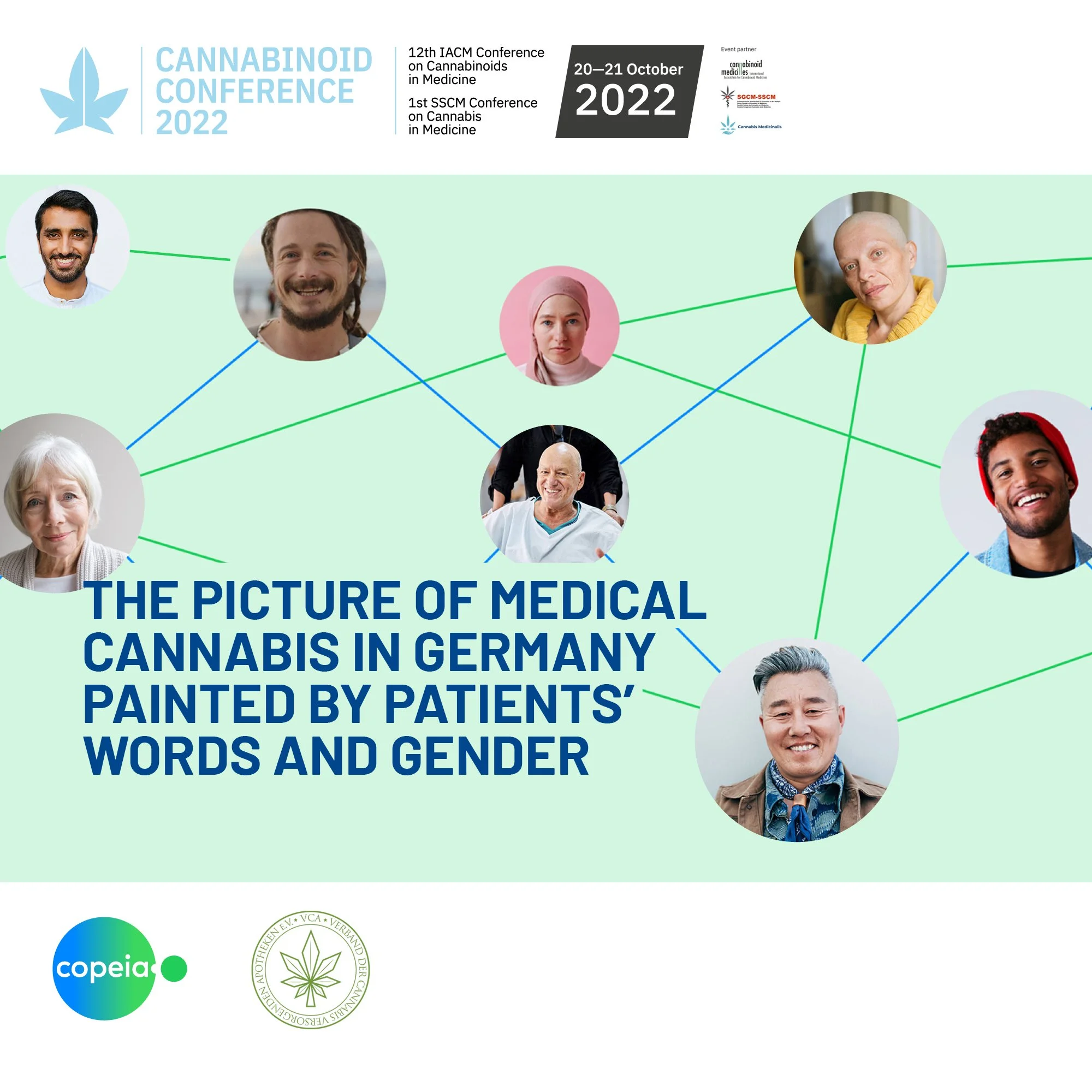Copeia Abstract / Cannabis Medicinalis
The Picture of Medical Cannabis in Germany Painted by Patients’ Words and Sex Differences
A.Landschaft (1,2), G.Hirt (2), A.Ihlenfeld (2), K.Gastmeier (3), S.Wirz (4)
Information Services Department, Boston Children’s Hospital, Boston, MA 02115;
Copeia GmbH, Bergisch Gladbach, Germany D-51469,
Dr. med. Knud Gastmeier,Praxis für Spezielle ambulante Palliativmedizin, Potsdam,Germany D-14482,
Department for Anesthesiology, Intensive Medicine, Pain and Palliative Medicine - Center for Pain Medicine; Weaning Center CURA Hospital Bad Honnef/GFO Clinics Bonn, Bad Honnef, Germany, D-53604
Introduction: Since March 2017, the number of German patients prescribed cannabis medical products grew. Aims: To assess German patients' free text narratives about medical cannabis therapy.
Methods: We conducted a nationwide, anonymous survey on medically prescribed cannabis products. Patients answered standardized questions online in a text dialog (“chatbot”) and had the option to write free text. We used Python to process the text using standard natural language processing (NLP) techniques to remove common words. Consequently, we calculated word frequencies in the full cohort and in two sub-cohorts.
Results: We distributed brochures with a hyperlink to the online questionnaire through a network of 50 cannabis pharmacies and patient organizations. Of the 1580 participants who interacted with the questionnaire, 1035 provided consent to use their answers for research purposes. A sub-cohort of 292 participants (193 male, 99 female) wrote free text of more than 32 characters.
Conclusions: Almost one-third of the participants used the optional free text field, which suggests important content to express in their own words. Word frequency analysis indicates focus on the clinical outcomes of the treatment and also a concern about its cost and reimbursement from statutory health insurance. In table 1, four terms refer to cost (‘kostenübernahme’,‘krankenkasse’, ‘kosten’, ‘krankenkassen’), with a higher proportion reported by males for all of them. In female narratives there is a higher rate of clinical terms.
This initial result requires further advanced NLP analysis.
Keywords: cannabis, natural language processing, patients’ survey, Germany.
Acknowledgements: We thank the Verband der Cannabis versorgenden Apotheken (VCA) for helping us to distribute flyers with a link to the online survey to patients of 50 German cannabis pharmacies.
This abstract is listed in the journal: «Medical Cannabis and Cannabinoids» (Karger Publishers, Basel, Switzerland) is the official journal of SSCM Swiss Society of Cannabis in Medicin and the SSCM-IACM IACM - International Association for Cannabinoid Medicines Cannabinoid Conference 2022. Cannabis Medicinalis
Cannabis Medicinalis
The 12th IACM Conference on Cannabinoids in Medicine & 1st SSCM Conference on Cannabis in Medicine took place on the 20th & 21st, of October 2022, at the Congress Centre in Basel, Switzerland, organized by the IACM (International Association for Cannabinoid Medicines) and SSCM (Swiss Working Group on Cannabinoids in Medicine).
Copeia's staff and advisory fellows have co-authored four research abstracts that were peer-reviewed by the scientific committee. We presented these at the poster session of the conference:
cannabismedicinalis.com
If you would like to learn more about Copeia, have questions or suggestions, please contact us by email and we will get back to you as soon as possible. We look forward to hearing from you.
Your Copeia team
Copeia’s digital health solutions evolve personalised treatment of cannabis patients
Copeia combines expertise from international cannabinoid research with practical knowledge of doctors, patients, pharmacies and producers.
Copeia is a software company based in Cologne and Berlin that develops AI-based products and workflow solutions to support medical cannabis care.

